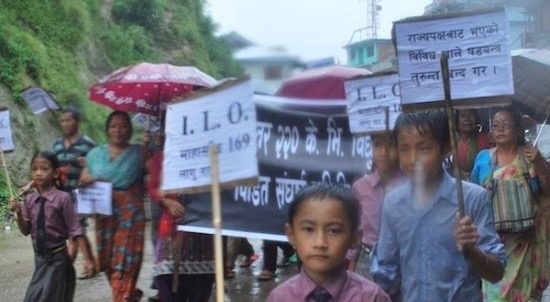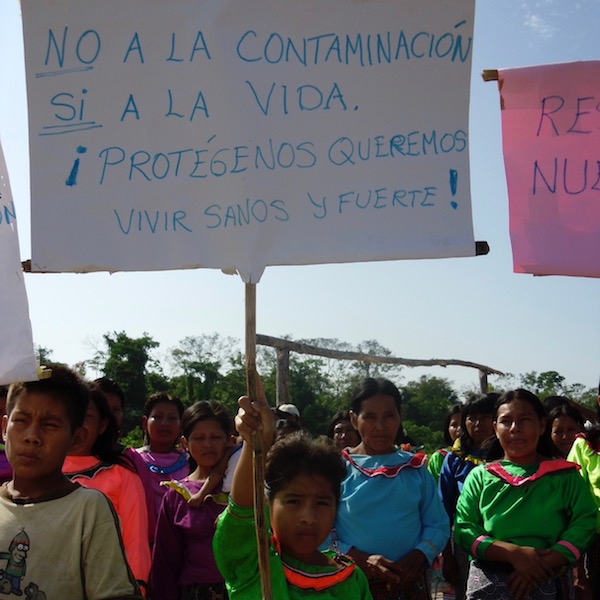Dismiss Intimidation, Not Civil Protests

On November 28, Greenpeace, BankTrack and other civil society organizations that supported the Standing Rock Sioux Tribe during their protest of the Dakota Access Pipeline, filed a motion to dismiss the lawsuit brought against them by pipeline builder Energy Transfer Partners. The court should dismiss this case, especially in light of recent reports that Energy Transfer hired an outside firm to build the case against the groups standing with the tribe. Energy Transfer’s lawsuit alleges that these organizations engaged in a misinformation campaign, manufactured evidence to support their claims, and funded terrorism against the project. The lawsuit is an example of the lengths a large corporation will take to intimidate civil society organizations (CSOs) and represents a lack of oversight of the private banks funding the DAPL project.
The pipeline was made possible through its financing, which comes from major private banks from around the world. Many of these banks have signed onto the Equator Principles, a set of guidelines that voluntarily commit the financial institutions to the same standards of social and environmental protection that multilateral development banks are supposed to follow when funding pipelines in developing countries. These standards include consultation with communities most affected by projects, but are non-binding and provide no mechanism for communities to file formal complaints.
But because there was little, if any, formal consultation in the case of DAPL, protesting became one of the only ways thw community could oppose the damaging project. In 2016, the community began a long protest of the pipeline’s construction on sacred land with vital waterways. They were met with violent retribution by private security forces and police officials. When protesters were shot with rubber bullets and sprayed with water in the freezing cold, civil society organizations, including Accountability Counsel, condemned the violations of their rights to assemble and seek redress of their grievances.
CSOs play an essential role in raising the voices of communities when they have been ignored, and this case was no exception. CSOs are often the only institutional power preventing governments or companies from crushing the dissent of communities affected by official decisions and actions. They provide vital services to ensure marginalized people can be heard, especially when they are not consulted on decisions that affect them.
As advocates for people hurt by development financing we hope the court will recognize how baseless this lawsuit is and dismiss it. But in many areas of the world, CSOs have no guarantee to a fair trial when suits are brought against them. Societies that don’t protect citizens that dissent certainly won’t protect the organizations that help those citizens. In many places, corporations are attempting to silence those who speak in opposition to their projects, demonstrated by a recent defamation lawsuit filed by a mining company in South Africa against two lawyers from the Centre for Environmental Rights, a CSO helping to expose environmentally damaging practices. The lawsuit levied by Energy Transfer is just the latest example of attempts to defame, intimidate, and silence civil society. In this case, and cases of popular protest all over the world, lawsuits meant to intimidate CSOs are filed to frighten and bankrupt these organizations, which often have limited resources.

Indigenous Peruvians, the Shipibo People, protest an oil spill in their main water source
The lawsuit against the CSOs supporting DAPL protesters is a litigous cover-up for the profound failure of financiers and Energy Transfer to productively engage with the Indigenous Peoples who are affected by the pipeline. If this failure happens in the United States, it can — and does — happen everywhere.
We advocate most often for those who are hurt by internationally financed projects. We are working to protect vulnerable communities by creating accountability at the level of financing, so that development banks and other international financial institutions are held responsible for harm at the projects they enable. We work to create and improve complaint offices and mechanisms for accountability so those hurt by projects can raise their voices, prevent abuses, and hopefully, be made whole.
BankTrack has been a consistent advocate for this kind of accountability at private banks and signatories to the Equator Principles, pushing for further community consultation in the investment process. As illustrated in many cases, privately financed projects can do just as much social and environmental harm as projects funded by multilateral investment banks. If multilateral investment banks have accountability mechanisms to ensure that the social and environmental effects of their projects are positive, why should private banks not be held accountable in the same way?
It’s possible that this act of intimidation and the violence against the Indigenous community might have been addressed through a complaint mechanism for the Equator Principles institutions funding the project. But we’ll never know, as no such complaint office currently exists. So we continue to fight for comprehensive accountability mechanisms that can deliver justice to local communities, activists, and CSOs that speak out.

